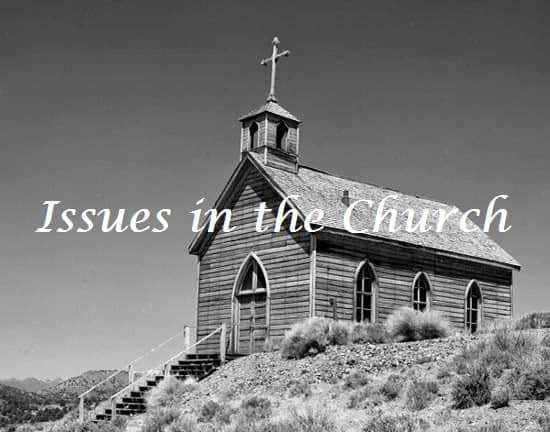⏱️ Estimated Reading Time: 7 min read
Editor’s note: The purpose of this series is to write on “Issues in the Church” that either aren’t talked about, ignored entirely, or that we want to contribute to the discussion on. Our goal with this series is to help our readers think through these issues from a biblical worldview with lots of practical gospel-application.
- Joel opened up our series looking at expository preaching: an end goal more than a style.
- Mike Cooper wrote on pastoral hospital visits.
- Dr. Josh Buice answered to important questions about expository preaching.
- Dr. David Schrock wrote on the question, “What is Jesus’s Evangelism Program?”
- Dave wrote on how to care for your pastor.
- Dave wrote on three keys to sermon listening and note-taking.
- Joey Tomlinson wrote about the priority of regularly communing with God.
- Dave wrote on biblical doctrine: the lifeblood of the Christian life.
- Dave wrote on Doctrine: The Fuel for Discipleship.
- Today Dr. Schrock writes on church membership.
**************************************************
In recent years, the human body has been reshaped and sometimes reengineered. Whereas gender was once biologically determined, today society invites children to choose their own gender. And for some, when their body doesn’t match their gender preference, they are invited to trade their parts for new ones.
Fortunately, Christians know that our bodies are not plastic figurines. We believe our bodies gifts from God, even if we might humbly protest their size, shape, or strength. Sadly, the same cannot be said about the body of Christ.
Christians who decry modern manipulations of gender often ignore the manifold ways Christ’s body has been misshapen. By ignoring what Scripture says about the church (a subject known as “ecclesiology”), evangelical churches have willingly retooled, repackaged, and recreated what churches look like—often with mantras like, “we do church differently,” or “we’re not your ordinary church.”
Such sloganeering reminds us how far the church is willing to bend with this principle in place: As long as we don’t change the message, it doesn’t matter how we do church. The problem with such a view is that it fundamentally ignores the Bible, especially how the NT speaks about membership in Christ’s body.
Is Church Membership Biblical?
Created to defend and declare the gospel (1 Tim 3:15), the church must always be willing to evaluate itself by Scripture. If it is true that a church’s life and ministry either displays or distorts the gospel (Eph 3:9–11), we must ask: How does (our) church membership affirm or deny the gospel? If there is no proof text demanding church membership (and their isn’t), why be so dogmatic about it?
Here’s my answer: the church without membership is like a body without lungs or lymph nodes. And demanding a proof text is like requiring a living body to undergo an EKG to prove they have a heartbeat. How can a body not have such members? How can a member of a living body not be alive? (For a fuller treatment of church membership, see Jonathan Leeman’s illuminating Church Membership).
By analogy, a church is made up of many members (1 Cor 12:12), which is to say, to be alive in Christ is to be united to his body. And while the Bible sometimes speaks of an undefined “universal church,” local church membership is the NT’s ruling presupposition. Nowhere is a Christian described who is not in communion with a local body.
In Acts, the churches counted the number of their members, and after baptism new members were “added” to that number. Likewise, Paul speaks of the “whole church” gathering (1 Cor 14:23) and a “majority” in that same church (2 Cor 2:6)—language implying that churches knew their members (cf. 1 John 2:19).
Even when missionaries like Paul and Barnabas were sent out, the church commissioned them and the missionaries planted churches—they didn’t just win unattached souls. While the apostles were unashamedly Christ-centered, they were equally church-centered. In fact, without an awareness of church membership in the NT, many of their actions make little sense.
How Does Church Membership Display the Gospel?
Now, if church membership is a NT presupposition, it must have a functional purpose. That purpose is to display the gospel of grace.
In Galatians 5:6 Paul explains how the only thing that matters is “faith working through love.” In other words, identification with Christ doesn’t come through circumcision (keeping of the law) or uncircumcision (ignoring the law); it comes through faith. But genuine faith always leads to love.
The same can be said of the church. Whereas faith in Christ is the singular prerequisite for (baptism and) church membership, such faith is proven genuine by love. As Jesus said, the world will know my disciples by their love (John 13:34–35), and the love he has in mind is the love of the brethren in the local church. While the lost should know our sacrificial love, it is the church’s love for one another that Jesus emphasizes.
When a church is filled with such brotherly love, the church demonstrates a people who are bound together by Christ’s gospel and not preferences, affinities, traditions, or contemporary fads. Such a love is race-uniting, age-embracing, tradition-obliterating, burden-bearing, and offense-forgiving. Like a neon beacon, it beckons the world to see the love offered in the gospel.
However, when brotherly love is absent, it mutes the gospel. Without it unlove suffocates every program of outreach, every series of revivals, every evangelistic Bible study. Therefore, what the lost need most is a church that loves one another and invites them to come and know the source of that love in the gospel.
Could it be one reason why so many churches see so few baptisms is their lack of love? Even when they preach the right gospel, could it be that the world doesn’t listen because they feel more love from their fraternity or their favorite bartender? Membership matters because it displays or denies the gospel.
Church Membership Coordinates Bodily Love
Still, church membership doesn’t create love either. Only the Spirit does (Gal 5:22). But church membership does ensure that the church has the right conditions for love to abide. For instance, it defines who we must love. It challenges us to love church members who are unlike us and who may even treat us badly. As Jesus said, even pagans can love those who love them (Matt 5:46); Christians show Christ’s love by the enduring and contra-conditional nature of their love.
While marketers emphasize church growth by way of certain shared interests, Christ calls us to preach the gospel, baptize all who believe, and love these new members like family. And like family, these believers will sin against us, and will need our grace and forgiveness. And conversely, we will need their forgiveness and forebearance. This is what membership in the church means—a community of sinners learning everyday how to apply the gospel to every relationship we have.
In this way, the church not only tells the gospel, it displays it. Impelled by the Spirit and the Word, members put on a gospel drama for the world. The Scripture provides the lines; Christ directs the play; and church members form the cast. In the church, membership doesn’t create love, but it does channel it and coordinate it.
Being the Body of Christ
Too often, church membership is seen only as a logistical utility, a matter for mailing lists and committee nominations. But in the Bible, membership is conceived of in living, breathing, bodily images. One person is an eye, another an ear, another a foot.
From this picture, it reminds us that living as a member of the body calls us to be healthy and sick together, to live and die together. It challenges us to know one another, pray for one another, serve one another, and forgive one another. In this way, the local church as Christ’s body displays the gospel to the world by means of focusing on their membership. Without it, the local body of believers looks less like Christ and more like our favorite parts of culture.
This post first appeared at David’s blog and is posted here with permission.




